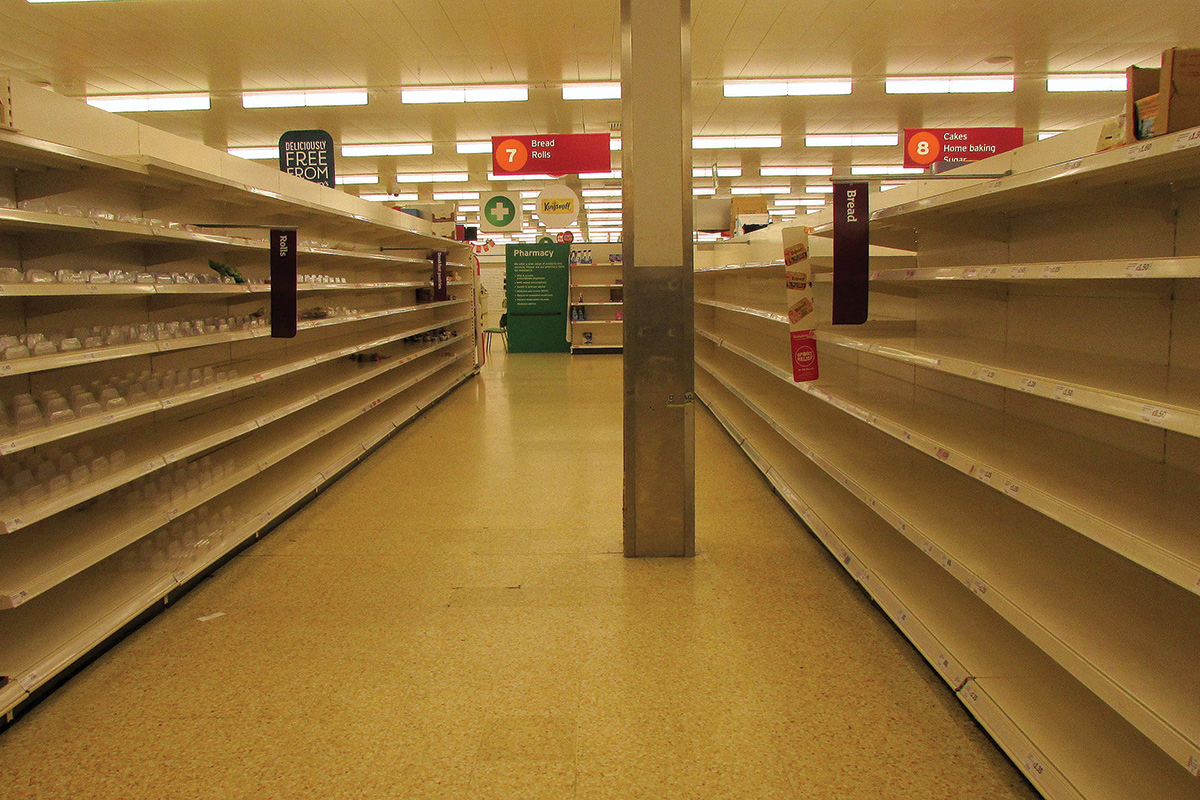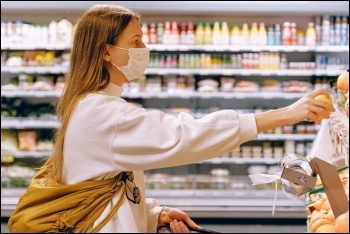Food supply and the coronavirus crisis
Capitalism means empty shelves, food insecurity, and soaring profits – the case for a socialist alternative
The global coronavirus pandemic has exposed the fragility of capitalist food supply systems – whose rationale is based on maximising profits rather than meeting human needs.
Everything – from the shortage of labour to pick fruit and vegetables, to the airfreighting of foods sometimes over thousands of miles, food insecurity, and price hiking – is currently under the spotlight.
Today’s health crisis means we cannot return to a system which means empty shelves while supermarket profits rocket skyward.
In the following articles, Socialist Party members argue the case for a food system based on socialism – a model of production and distribution that is efficient and can meet of the population.
Supermarket supply chains
Delivering short-term profits but not the goods we need
Socialist Party members in Usdaw shop and distribution workers’ union
Many supermarket shelves have been left bare in recent weeks, as if locusts have accompanied the coronavirus. The government and their mouthpieces in the media have fuelled anger across the population by blaming the empty shelves on ordinary people panic buying and stockpiling essential items.
While some individuals may have bought too much, and there has been some stockpiling, this doesn’t tell the whole story.

Empty shelves, Photo Iain Dalton
Between 1 and 21 March, supermarkets saw a 10% increase in sales. This is to be expected, as people who have been told to self-isolate for weeks, not eat out, and prepare for a lockdown, will obviously buy more to ensure they have enough for themselves and their families, and to minimise shopping trips.
The increase in purchasing is therefore modest, explicable, even justified. But what about the empty shelves which understandably left many – including key workers and the elderly – not able to purchase necessities?
Supermarkets operate using ‘fast-moving consumer goods just-in-time’ supply chains. This means most stores, especially smaller stores in cities which have been some of the hardest hit, do not carry excess stock. They base their deliveries on sales from the same period in previous years, ‘like-for-like’ sales in retail speak, and on their own marketing and sales plans.
It only takes a small disruption to the norm for these supply chains to fail and leave empty shelves. The disruption of the coronavirus crisis has been increased sales, especially on certain goods, and the just-in-time supply model has been exposed as being woefully short term and inflexible. It is only fit to make profit, not to meet need.
The inflexibility and short-termism is the fault of the supermarket bosses and companies. Firstly, they failed to anticipate increased sales, despite the examples of other countries. Secondly, they failed to react quickly enough to the crisis, taking weeks to enact modest rationing and special shopping hours. And thirdly, in most cases they still have not altered business and marketing plans.
For example, delivery lorries are still arriving at stores carrying huge amounts of Easter eggs, taking up space which could be filled with essential goods. Instead, stock is left in warehouses, and only delivered in small batches, as if it is business as usual. Easter eggs may be a pleasant distraction from the stress of this crisis. However, most people would argue Easter eggs are low priority at the moment!
The spectre of a no-deal Brexit was also used to issue warnings about the inability of just-in-time supply chains to cope with even slight shifts in the chain, and the possibility of massive chaos and shortages.
Compounding these problems is the competition and duplication that exists in the supermarket industry. Competition laws restrict companies from sharing their separate warehouses, distribution centres and delivery lorries but these laws have been relaxed to cope with the crisis.
As the coronavirus crisis deepens, these problems could get even worse as delivery drivers and warehouse workers fall sick, and both UK and European supply chains buckle under the pressure.
This crisis and the consequences on food supply show the vital need for coordination and socialist planning of our food supply chain, rather than the chaos that the capitalist ‘free market’ has created.
The only way to ensure that companies, supermarkets and supply chains are run on the basis of long-term social need, rather than short-term private profit, is by bringing them into public ownership under democratic workers’ control and management.
Retail and distribution workers have an important, central role in securing the safety and sustenance of the population. Retail unions should be demanding more control for workers in stores and warehouses to ensure this, and ultimately nationalisation of the major retailers to guarantee food supply.
Profits soar in supermarket sector
Iain Dalton, Usdaw union Broad Left chair
While the rest of the economy is reeling, the big supermarket chains are enjoying a profit bonanza. Photos have abounded on social media of supermarket shelves stripped bare. Confusion about what measures the government was planning to take, and talk of a total shutdown of the country, has fuelled increased purchases.
During a daily UK government briefing on 21 March, the environment secretary suggested that an extra £1 billion worth of food had been bought in the previous weeks. Supermarkets have reported 500% and even 700% increases on annual like-for-like sales in recent weeks.
With restaurants, cafes and schools closed, there are expectations that this alone could see an extra £15 billion in food sales through supermarkets. But with their already bigger store footprint, it’s entirely possible the big retail chains could make up some of the market share they had lost to the discounters over the last few years.
This is particularly the case with online food deliveries, where companies have been expanding their capacity. Many of the estimated 40,000 temporary workers hired are in this sector.
Belated efforts
But apart from these sales increases, the supermarkets will benefit from some of the government’s emergency measures. The 100% rates holiday for retail means massive savings. Last year Tesco paid £750 million in business rates, while Sainsbury’s paid £567 million and Morrisons £308 million. After this, shares in Sainsbury’s went up 11.7%, Ocado 11.2% and Morrisons 10.8%.
But what about their hardworking staff making all this possible, working in one of the few workplaces remaining still open and, in the case of stores, coming into daily contact with customers who may have coronavirus? Belatedly, supermarkets have taken some measures to implement social distancing measures and bring in PPE. They have made several rounds of improvements on sick pay in relation to coronavirus, with some companies announcing a 10% bonus to wages for the next couple of months
But this is a pittance compared to their soaring profits. In some companies workers don’t even reach £10 an hour, the demand that retail and distribution union Usdaw adopted back in 2016. The Institute for Fiscal Studies is lobbying for tiny minimum wage uplift scheduled for April to not go ahead (see p6).
Socialist Party members in Usdaw are demanding that retail workers’ squeezed wages are commensurate with the key role they are currently playing ensuring the food supply. We are campaigning for a minimum wage of £15 an hour, a restoration of premium payments, and paid breaks that companies have stolen over the past decades.
Food poverty – what councils should be doing
Eating well will be a key means of staying fit and resisting the virus. For Boris and the royals, recovery won’t be the struggle that it is for millions hit by the economic tsunami of coronavirus, on top of a decade of Tory austerity.
For all the warm words of comfort from the government of wealthy Etonians, the cold reality is over 1.5 million adults say they don’t have enough food, and over half of all NHS workers are worried about getting food, according to food charity the Food Foundation.
Of the 1.5 million considered most at risk from C-19 and told to stay at home, over 800,000 were considered to be in food poverty before the crisis. Government promises for the army to supply food parcels to 400,000 vulnerable people will once again be too little, too late.
Even this cruel Tory government can’t hide from the statistics that the poorest are most vulnerable in this coronavirus crisis.
With 500,000 claiming Universal Credit in recent days, most without savings and no prospect of money for weeks, many will be borrowing to stay afloat. Many unable to borrow will be forced to go hungry or steal.
It is estimated over six million, low-paid and insecure workers are still going to work, forced to for fear of being out of pocket to buy food.
Schools that have remained open are continuing to feed children on free school meals. As the days have gone by, the number of families not coping is rising dramatically, and greater numbers are turning up for emergency food parcels. The promises of “prepared meals, food parcels (for collection or delivery) or supermarket vouchers from schools”, for the eligible 8.3 million children have not materialised for many.
There is a ticking time bomb waiting to explode if money and food aren’t provided quickly. Food riots and stealing from supermarkets, which are already starting to happen in Italy, have forced the government there to act by distributing €400 million of food stamps.
For the most vulnerable, the elderly and isolated in working-class communities stripped of their welfare services by austerity, a letter from Boris at a cost of £5.8 million won’t be any comfort.
As the government, the army and its team of charities fumble, what can be done to urgently address this crisis and to ensure food reaches those most vulnerable, those hit by the mass lay-offs and at home without money to pay for the essentials?
It is local Labour councils who are in the best position to act and put pressure on the Tories to step up, with an estimated £7 billion collectively held in reserves.
Labour councils should immediately set up emergency funds, using their reserves and borrowing powers, to ensure no one is left behind by the failures of Tory measures to respond, and get emergency payments to help workers abandoned by their bosses. Collectively, Labour council leaders can then send the bill to Boris and demand that central government funds all emergency spending and borrowing made by local councils.
With the full support of the Trade Union Congress and its six million members, the pressure on Johnson to act would be overwhelming.
Councils are in a powerful position to bring together their resources and direct food distributors to make sure there is a regulated supply of food and essentials that reaches everyone.
Where the elderly are isolated and without help, council rapid response teams could ensure food and care gets to everyone who needs it, resourced by the reemployment of the many council workers sacked in the last decade, on full-time contracts.
While this is an enormous and urgent task, it could be accomplished effectively and efficiently if council workers, their trade unions and the wider trade union movement, alongside democratically elected local community action committees, were mobilised to organise in their local communities.
The democratic oversight of the organised working class is essential to ensure that everyone’s needs are met, that food and essential goods are distributed to all.
Huge pressure will grow in the coming days on the government to act. Equally, the silent hand of big business will be felt on Tory ministers to remind them of their need to be ‘fiscally responsible’ and not ‘overspend’. They will only concede in the interests of workers and our communities what they are forced to by the pressure applied by the labour movement.
It is vital that trade unions and local trade union councils step up the pressure on their local Labour councils to do whatever it takes to end the food crisis engulfing working-class homes right now.
Nick Chaffey, Socialist Party national committee
A new land army?
Simon Carter
As global ‘just-in-time’ food supply chains break under the impact of the coronavirus pandemic, the idea of bringing more UK land into agricultural use is gaining traction.
At present, coronavirus travel restrictions, combined with the government’s post-Brexit limits on using overseas seasonal labour, means that crops could be left rotting in fields (the recent floods have also impacted on production).
Farmers have said that all this could result in a shortage of 80,000 agricultural workers and have called for a ‘land army’ to be recruited – with the public purse meeting the bill!
Currently, the UK is ‘food insecure’ and imports over 40% of food consumed. To avoid possible food shortages, a big increase in agricultural land and agricultural workers is required. Moreover, roughly twice as much land is used for grazing than crop production, but only produces less than 2% of the protein we eat.
Who owns the land?
So who owns the land? Last year the Guardian reported than more than half of all UK land is owned by less than 1% of the population – mainly aristocrats, corporations, city bankers and oligarchs. What’s more, the EU and the UK government’s farm subsidies mean some landowners receive £1 million or more a year – no benefits cap here!
Government ministers routinely say the country is at war with coronavirus. In World War Two the British government, faced with acute food shortages, requisitioned land and mobilised a land army of mainly women workers.
Translating that governmental response into dealing with the coronavirus crisis today means nationalising large swathes of land from the aforementioned 1% of wealthy owners and organising what land is usable for agricultural (crop) production. Nationalisation of the land was a demand of the Rural and Agricultural Workers Union, formed in 1906 (later part of TGWU and now Unite).
Landworkers, historically, have suffered low pay. In 2013 the Tories abolished the Agricultural Wages Board, through which the unions had negotiated with the employers, allowing ‘market forces’ to drive down wages and conditions.
Higher wages, equivalent to wages in industry, should be implemented to encourage recruitment, including overseas workers who must be on these same nationally agreed rates of pay and terms of employment. These measures should be under the oversight of the trade unions that currently organise agricultural workers.











